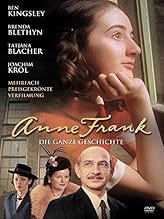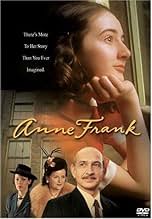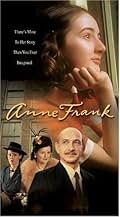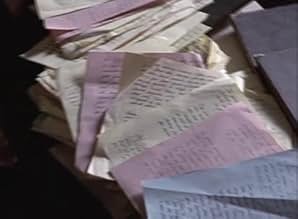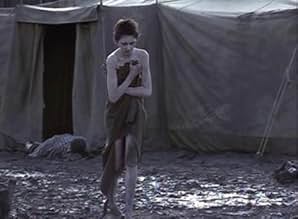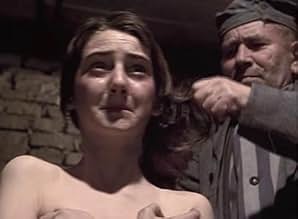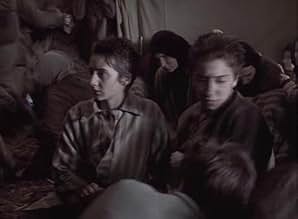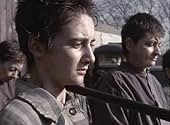La storia di Anna Frank
Aggiungi una trama nella tua linguaThe life of Anne Frank and her family from 1939 to 1945: pre-war fears, invasion of the Netherlands by German troops, hiding in Amsterdam, deportation to the camps, return of Anne's father.The life of Anne Frank and her family from 1939 to 1945: pre-war fears, invasion of the Netherlands by German troops, hiding in Amsterdam, deportation to the camps, return of Anne's father.The life of Anne Frank and her family from 1939 to 1945: pre-war fears, invasion of the Netherlands by German troops, hiding in Amsterdam, deportation to the camps, return of Anne's father.
- Vincitore di 2 Primetime Emmy
- 15 vittorie e 32 candidature totali
Recensioni in evidenza
I have just finished watching the second half of this movie on ABC. The scenes of the concentraion camps are horrific, and really tug at your heart. I can only imagine what these camps were like for the real people and how survivors live life today. Since the story wasn't told from Anne's diary, the viewers got another view of the short but significant life Anne lived, headed by a wonder all-star cast. The movie began with Anne in 1936 and ended upon her death at Bergen-Belsen in 1945.
Hannah Taylor-Gordon was excellent as Anne. At first I wondered if she was too young (at age 14) to portray such a dramatic role, but as Anne grew, Hannah grew as well. Ben Kingsley and Tatjana Blacher played Anne and Margot's parents wonderfully, and the rest of the cast added to the beauty, horror, and passion of the film: Lili Taylor, Rob Das, Brenda Blethyn, and many more.
For me, the virtual incarceration of her family in the factory was very sad and thought-provoking. Taken from their normal lives and stripped of all those things they held dear, Anne's family strives to remain positive of better times ahead. How would we fare if required to give up all that we possessed and go into hiding for fear of our lives? A totally depressing thought, and yet that is what happened to Anne and her family.
The later scenes, after the family was captured, humiliated, separated and sent to concentration camps, is simply tragic.
The fine performances of Hannah Taylor-Gordon in the title role and Ben Kingsley as her father, Otto Frank, deserve special mention, although the entire cast was believable. Hannah Taylor-Gordon's performance was a revelation - she conveyed a range of emotions that superbly captured Anne's spirit and also her human weaknesses.
The movie is not without its weaknesses. It is slow at times and could perhaps been improved by tighter editing, although this may have detracted from the accurate portrayal of the tediousness of living concealed behind closed doors for so long a period.
The concentration camp scenes are disturbing and Anne's gradual physical deterioration is depressing. It is not a movie to entertain but one to stir the emotions and the resolve to ensure that this sort of persecution and genocide is never again allowed to happen.
It is also a depressing reminder that it still is happening in various parts of the world.
Anne was magnificently played by Hannah Taylor Gordon. She is one of the best Annex that I have seen yet. She was perfect in her characterization and really made you love her. You looked at her on screen and you were caught in love with instantly, she was like magic on screen. She as well as Ben Kingsley and Brenda Blethyn both deserve Emmy nominations for their work.
Otto and Auguste van Pels were spot on. Ben playing Otto Frank not as a regal saintly savior of the Annex members (although in many respects he really was) but as a guiding light, the leader, and the most intelligent. Brenda Blethyn turns in another great performance as the spoiled and unadaptable Mrs. van Pels. Great in all her scenes you learn to give sympathy to this woman in a way you don't give anyone else, especially when you see her in the end.
The rest on the Annex members were also nice. Edith Frank was shown as she might really have been in real life. A woman going through a mid-life crises of sorts. Looking back and perhaps not being quite satisfied with her marriage and life. Peter van Pels was as I've never seen him before. The actor was excellent and gave life to Peter which is something I've always wanted to see from the Peter van Pels actors. Mr. van Pels and Mr. Pfeffer are wonderful too. And all of the Secret annex occupants really made a great relationship with the workers.
Lili Taylor pulled of a nice performance as Miep, very selfless and hard working. The rest were great too, including the warehouse worker. However, my main complaint was that Bep Voskuijl was shown to be an utter ditz. Maybe she was written this way because Miep said that that was the way she was, however, I did find it somewhat sad to see her portrayed that way.
The crew also pulled of excellent work. The costuming was nice. Barbara Lane was able to show with good quality how that Franks, van Pels, and Mr. Pfeffer were not poor. Never were they poor, they were very well off. I feel many costumers in the past have assumed that because they were all Jews being persecuted and in hiding that they were poor. Although the quality of clothing would have gone down with time (as shown) she still was able to put forth wonderful work. As did the art department going into nice detail to recreate the annex and the Frank house. Brilliantly filmed all around, power to the writer and producers for going outside the annex.
Lo sapevi?
- QuizSteven Spielberg was to be the executive producer, but declined after receiving a letter from Anne Frank's relatives asking him not be involved with the project because it was not based on the authorized account of Frank's life.
- BlooperIn the movie, the address given to the Germans of the hiding place over the telephone by the supposed informer is incorrect. The informer says the address is 263 Lindtstradt, but was actually 263 Prinsengracht. It still exists today as the Anne Frank House museum in Amsterdam. The real betrayer of the hiding place has never been revealed or proven beyond only circumstantial evidence. The informer depicted in the movie is based on the belief of Melissa Muller, who wrote the book (Anne Frank: A Biography) that the movie is largely based on. In her book "The Hidden Life of Otto Frank" by Carol Ann Lee, which was published in 2002 and revised in 2003, an entirely different theory as to the identity of the informer is presented. Officially, the identity of the actual informer that betrayed those in the hiding place has never been conclusively determined and most likely never will be, as most of those that would be able to shed more light on the subject have since died.
- Citazioni
Margot Frank: Do you remember how - how I was always taking care of you when you were little?
Anne Frank: Well, it's my turn to take care of you now.
Margot Frank: It doesn't matter anymore.
Anne Frank: No! You can't leave me here.
Margot Frank: Tell me a story, Anne. I used to love your stories.
Anne Frank: Pim's stories were always much better than mine. Poor Pim.
Margot Frank: But you're still going to be a writer though, aren't you? And he'd like that. Do you remember how we talked about it? About - about what we were going to do, after the war?
Anne Frank: And what were you going to be?
Margot Frank: I can't - I can't remember.
Anne Frank: Yes, you can. You have to! You wanted to be a nurse. That's what you told me.
Margot Frank: That's right. A nurse. A nurse in - in Palestine.
Anne Frank: Paris or London, that's where I'm going. To see the world.
Margot Frank: To see the world...
- ConnessioniFeatured in The 53rd Annual Primetime Emmy Awards (2001)
I più visti
- How many seasons does Anne Frank: The Whole Story have?Powered by Alexa
Dettagli
- Data di uscita
- Paesi di origine
- Lingue
- Celebre anche come
- Anne Frank: The Whole Story
- Luoghi delle riprese
- Aziende produttrici
- Vedi altri crediti dell’azienda su IMDbPro
- Tempo di esecuzione1 ora 35 minuti
- Colore
- Mix di suoni
- Proporzioni
- 1.33 : 1
Contribuisci a questa pagina



